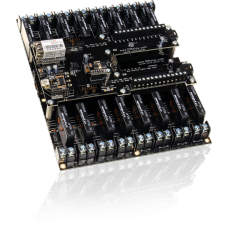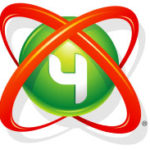Fusion 16-Channel Solid State Relay Controller with 16 GPIO or ADC and I2C
Fusion 16-Channel Solid-State Relay Controller Overview
This 16-Channel SPST Solid-State Relay Controller combines superior noise immunity and isolation with an incredible life span by utilizing Crydom solid-state relays. Fusion makes it easy to automate solid-state relays unlike any other controller in the world. Configure relays to activate based on sensor inputs, or configure relay activation under the direction of a time schedule. Dual interface allows two computers to take control of the on-board relays simultaneously, keeping you in control using any two of your favorite communication technologies. Fusion is the world’s most expandable relay controller. We currently manufacture over 300 controllers that plug into the Fusion I2C expansion port (see NCD I2C Devices Category). Fusion is unmatched by any competing controller, as it was designed for high-functionality at a very low price with limitless expansion capabilities. Fusion is configured using Base Station software, so you don’t have to program to use Fusion. If you are a programmer, learn to send commands to Fusion by watching the log windows in Base Station. We show you all the data you are sending so you can easily replicate our features in your own software. Learn to use the world’s most powerful relay controller and take advantage of our unlimited expansion as we continue to build hundreds of new sensors and controllers. Fusion hardware includes 16 I/O lines that can be used for Digital I/O, 8/10-Bit Analog to Digital Conversion, or Two UXP expansion ports for adding older NCD expansion devices. Fusion also includes a FXR relay expansion port, allowing control of more relays of mixed types if needed. The optional TLEE memory and Real Time Clock expansion enables enhanced features and relay activation from a time schedule.
Fusion: The World’s Most Versatile Relay Controller
Fusion controllers are the most powerful controllers we have ever manufactured. With an unrivaled number of communication options, Fusion makes it easy to communicate to any computer system, anywhere in the world. Fusion is a combination of computer controlled relays, with the ability to control relays automatically based on sensor input. Fusion controllers are also capable of storing a time schedule, allowing relays to turn on and off at specific times of the day. Fusion controllers include a I2C expansion port, making it possible to plug in hundreds of different expansion boards. Read temperature, humidity, pressure, light levels, current monitoring, control PWM outputs, FETs, and much much more. Fusion is the most versatile and expandable relay controller in the world.
ProXR: Computer Controlled RelaysProXR Relay control capabilities offer the ultimate computer controlled relay solution. The 4th Generation ProXR Advanced command set is designed to give you computer control of relays, overriding the sensor and time control features configured into the controller. |
|
Reactor: Sensor Controlled RelaysWhen your application demands sensor controlled relays, Reactor will let you point and click your way into a simple configuration that triggers relays, timers, and counters based on sensor values. Let Reactor manage your relay control needs based on temperature, light levels, humidity, motion detection, and much more. Compatible with most sensors, Reactor is a powerhouse relay control solution for managing your most demanding automation tasks without programming. |
|
Taralist: Time Schedule Controlled RelaysNeed relays to activate on a regular schedule? Taralist allows you to build a Time Activated Relay Schedule with up to 999 events. With Daylight Savings Time, Holidays, and Leap Year support, Taralist is capable of managing about any application that requires relay control on a regular time schedule. Link Taralist and Reactor for applications that require sensor controlled relays on a time schedule. (see recommended accessories below for important information) |
|
I2C: Expansion Beyond ImaginationFusion is a master of expansion, with over 300 expansion controllers that plug in to the I2C port. Plug in just about any kind of expansion you can think of, choose from a wide variety of sensors and controllers. I2C expansion is where we are currently focusing our design efforts. We are constantly developing our software drivers so you can see working examples immediately. Please note that our hardware library is currently ahead of our software samples, so if there is anything you need in particular, just let us know and we will get samples for you within a few days. |
Fusion: Built to Expand
With 2 UXP expansion ports, Fusion controllers know how to expand. Easily add Analog to Digital Converters, Contact Closure detectors and digital potentiometers to your Fusion controller. Fusion controllers also support I2C devices, adding a wide variety of sensors to meet your application objectives. The FXR Expansion Port allows you to add expansion relay boards to your Fusion controller.
Fusion Series Controllers have 16 programmable I/O lines, which may be used for contact closure input, digital input, digital output, 8/10-Bit Analog to Digital Conversion, or I²C expansion. In most cases, these features may be mixed and matched as your application requires.
Fusion Series Relay Controllers know how to connect to your application. With a simple point and click configuration, you can read a variety of sensors in just a few minutes. Fusion will automatically monitor your sensor in the background and make relay control decisions if a sensor is tripped or goes outside an acceptable range.
- Contact Closure Input Capabilities
- Fusion Digital I/O
- Fusion Analog to Digital Conversion
- I2C Expandability
- Two UXP Ports
- Distance Measurement
- FXR Expansion Port
Fusion: Built to Automate
Fusion Series Relay Controllers were built to make relay control decisions automatically. From time scheduling to sensor monitoring, Fusion offers an arsenal of features designed to quickly and intuitively automate relays control functions without programming. We chose Fusion as the series name because it is a true blending of technologies we have been developing since 1995. Fusion is the most powerful series controllers we have ever created, with a clear overlap of technologies working together to create the ultimate relay control solution.
- Base Station Software
- Time Scheduling
- Reactor Processor
- Sensor Monitoring
- Input Limits and Triggers
- Trigger Events
- Timers
- Counters
- Flashers
- Override Controller
World Wide Access
Fusion controllers were designed for internet access, making Fusion the perfect choice for internet control and web-page based control applications. Pursuant to our goals of worldwide access, Fusion controllers were designed to work with WiFi, Ethernet, Web-Page Based Ethernet, and 802.15.4 Wireless. Each of these technologies adds unique benefits for worldwide access of Fusion controllers.
- WiNet Gateway and Fusion
- TCP/IP Ethernet & WiFi Interface
- Web-i WebRelay Ethernet Interface
- Wireless 802.15.4 Industrial Wireless
- Push Notification
Recommended Accessories
Many accessories are available for the Fusion series controllers, but there are two accessories that should be considered above all others.
The TLEE Expansion Module adds the following benefits:
- Adds Real-Time Clock and additional EEPROM Memory
- Enables Taralist Time Activated Relay Scheduling Features
- Expands Reactor Features to Include 60% More Event Triggers
- Allows Fusion Controllers to Take Control of other Wireless Fusion Controllers (experimental)
- Enables Sensor Sharing between Fusion Controllers (experimental)
- Enables Push Notifications
At least one USB communications module (Part Number: ZUSB) should be on-hand, just in case you have problems with your Fusion series controller. It may not be possible for technical support to offer guidance without at-least one ZUSB on-hand for trouble-shooting purposes.
Base Station Software is a free download from our web site, and should be considered the starting point for using any NCD device. Nearly every feature of a Fusion controller requires Base Station Software for configuration and/or testing. Base Station is essential to successful use of Fusion series controllers. Base Station will talk to any Fusion controller using any communication technology, either in a localized installation or over the internet.
Fusion: Built to Communicate
Dual communication port interface means you have choices. Pick any two of your favorite communication technologies: Bluetooth, USB, WiFi, Ethernet, Ethernet Web-i Web Page, 802.15.4 Wireless, ZigBee Mesh, or RS-232. Fusion Easily adapts to the communication technologies you need most. Need access to your controller over two different networks? No problem, just use two Ethernet/WiFi communication technologies. Fusion lives and breathes the protocols of internet communications.
Fusion controllers feature TWO interface ports. Pick any two communication options below and take control using your favorite communication technology.Learn about Fusion Communication Options

802.15.4 Long-Range Wireless
Use 802.15.4 Communications if you require industrial strength long-range wireless communications. 802.15.4 is a point-to-point wireless standard, allowing fast communications. The wireless protocol acts as a long-distance wireless serial port, allowing wireless operation with no modification to software.

900HP-S3B Industrial Wireless Mesh
Long-Range Wireless Mesh networking is our favorite of all wireless communication technologies. This communication module will hop data from one location to another to reach its intended destination. Data hopping is a integrated feature of this communication technology, users do not need to do anything other than make sure wireless modules stay within hopping range of each other. We use the Digi 900HP-S3B module in our products, as this is the best the industry has to offer. With a 2 mile range between modules and up to 8 hops, it is possible to cover 16 miles of wireless territory using this technology. Using high-gain antennas, this module is capable of communicating to a remote module up to 28 miles away.
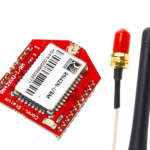
Bluetooth
Bluetooth is a easy way to add wireless communications to the NCD Industrial product line. The Bluetooth communications option acts as a transparent serial port between your computer and NCD devices. Simply pair the device with your computer and access the device through the COM port that is associated with the Bluetooth communications module.

Ethernet TCP/IP
Control NCD devices using standard Ethernet TCP/IP communications. Simply open a socket and send and receive TCP/IP data to control our devices. Our Ethernet TCP/IP Communication modules feature the Lantronix XPort communications module, the best in the industry. The Lantronix XPort module is an industrial workhorse that we have trusted for many years.

Ethernet Web-i WebRelay Communications
NCD Controllers equipped with a Web-i WebRelay interface may be controlled from a built-in web page. The NCD WebRelay interface module feature a Ethernet connection, allowing control of our devices from anywhere in the world using a web browser.
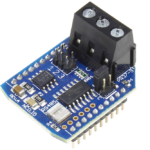
RS-485 Serial Communications Node
Our RS-485 Serial Communications Module makes it easy to network up to 256 NCD devices together at distances up to 4,000 feet. Each RS-485 node includes 3 screw-terminals for a 3-wire connection to the RS-485 master.

RS-232 Serial
NCD RS-232 Serial Communication modules make it easy to integrate the worlds most prolific communication standard. Easily interface to desktop PCs and laptops for easy control via standard serial commands. Most NCD devices typically default to 115.2K Baud; however, older low-cost devices implement 9600 baud data rate as the predominate standard.

USB
Our USB interface module makes it easy to control our devices using the USB port. Simply plug into any available USB port and start controlling our devices using standard serial commands. NCD USB Interface modules feature genuine FTDI USB to Serial Converter Chips, the very best in the industry.
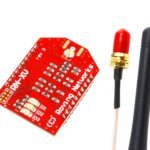
WiFi TCP/IP
Control NCD devices using standard WiFi TCP/IP communications. Simply open a socket and send and receive TCP/IP data to control our devices. NCD WiFi communication modules are manufactured by Microchip, the world leader in microcontrollers.

ZigBee® Wireless
ZigBee® wireless communications is a popular standard among our customers. The wireless protocol acts as a long-distance wireless serial port, allowing wireless operation with no modification to software.
Solid State Relays
Solid state relays are ideal for agricultural switching applications, or remotely located switching. SSRs are frequently chosen to control pumps, valves, solenoids, lights, and other high-reliability applications. NCD solid-state relay controllers do not include solid-state relays, but you will have the option to choose the type of solid state relays you require when customizing your product. This controller is designed specifically to fit select Crydom solid-state relays, but may be compatible other solid-state relays made by other companies.
Features
- 16 SPST Solid-State Relays Configured During Purchase
- Dual Communication Ports Talk to 2 PCs Simultaneously
- Supports Sensor, Time, or Computer Controlled Relays
- Configure for Automatic Relay Activation without a Computer
- I²C Port for Unlimited Expansion Options
- Supports Push Notification Events Based on Inputs
- Control External Relays Based on Sensor Inputs
- Base Station Software Guides you through All Features
- Dual 8-Channel 10-Bit A/D Converters (*Shared)
- Dual 8-Channel Programmable GPIO (*Shared)
- Dual UXP I/O Expansion Ports (*Shared)
- Optional RTC & Memory Expand Capabilities
- FXR Relay Expansion Port for Relay Expansion
- *Shared Features Cannot be Combined, Choose Only One
Enter the code in the box below:
